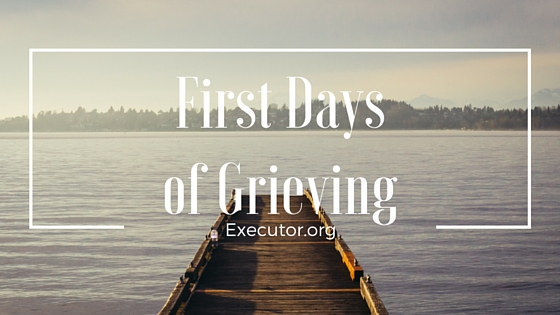
The First Days of Grieving – Losing a Parent
“The First Days of Grieving” by Executor.org aims to help those who have lost a parent navigate grief, maintain positive family relationships, and successfully manage the complex executor process.
Losing a parent can feel earth-shattering. Some of us lose a person who first made us laugh, healed many wounds with a simple hug, and was an unwavering ally. Others – those with more complicated parent-child relationships – lose the hope of a better relationship with mom or dad tomorrow.
The first days and weeks after a parent’s death can be a blur. Whether the death was sudden or after a long illness, the reality of the death can be shocking. Most of us, even when we understand that time is limited and death is near, still have hope for another day, or even another hour with our loved one.
In the first days after your loss, you’ll likely be busy with planning and attending funeral services. Loved ones will stop by to offer condolences and support, and time will be spent reminiscing about days passed.
But there can be times when you feel completely disconnected from the world, too. A friend recently told me of a quick trip she took to the grocery store two days after her mother died. As she waited in line, she listened to the woman in front of her complain loudly about how her day was “ruined” because she couldn’t get a manicure. It was all my friend could do, she said, not to scream, “I just lost the most important person in the world to me and you’re complaining about a stupid manicure appointment?” In that moment, she couldn’t understand how the world, and its trivial matters, could simply go on.
At Executor.org, our primary mission is to help simplify the estate settlement process for executors, saving them time and money as they complete their executor duties. A part of successful completion of this process is helping executors of an estate become emotionally prepared for the task at hand. So, as part of our work,, we have talked with those grieving, consulted with a trained psychotherapist about bereavement, and studied the latest in grief research. Here’s what we learned about those first days after losing a parent:
Whether you’re mad, sad or glad, it’s OK
There is really no “right” reaction to death. Bereavement is a very personal matter. Feeling sad is normal, of course, and most of us expect to feel that way. But that’s not the only emotion that can overcome us when we lose a parent. We might be mad that our parents didn’t take better care of themselves, frustrated that doctors or paramedics could not save them, or upset with ourselves for not doing something other than what we did. We may be glad or relieved our parent’s life – especially if they have been struggling with illness – has ended. All of these emotions are normal and you shouldn’t feel badly about feeling them.
Feeling like you’re in a fog is normal
The death of parent can turn our world upside down in a variety of ways. You’ll likely feel exhausted and not all that interested in work, small talk or your normal hobbies and pastimes. Bereavement can make it difficult to concentrate, remember things, or be fully engaged in the world around us.
Unpredictable emotions are a predictable part of grieving
Even the most emotionally level people can find themselves dealing with a wide range of emotions where they are grieving, especially in the first days. And these emotions can come and go quickly. You might become unusually angry at something that normally would not bother you in the least. Or you may find yourself crying at what seems like surprising moments. While this can make you feel out of control at times, it is normal to experience a variety of unpredictable emotions when you are grieving.
You are not alone
. Unfortunately, we all suffer what can seem like unbearable loss. Because of this, there are many resources to help those who are grieving. Mental health therapists, support groups, caring friends and family can all be a great help if you are struggling with loss. If you aren’t sure where to go for help, try searching online for “grief resources,” “grief counseling,” “grief support groups” or other related terms. Funeral directors can often also be great sources and might know about local support groups in your area. Finally, it is always good to talk to your doctor about your grief. Even if they aren’t experts in the matter, they can provide valuable resources.
Nothing in life prepares you for the loss of a parent. And, the Bereavement Cycle will often take at least a year, and for many people much longer. You will get through it, however, and hopefully always remember the special memories that you and your parent created together.
Next time in our Losing a Parent series: Helping Siblings Cope with the Death of a Parent
Use our tool to simplify the process and minimize your stress.